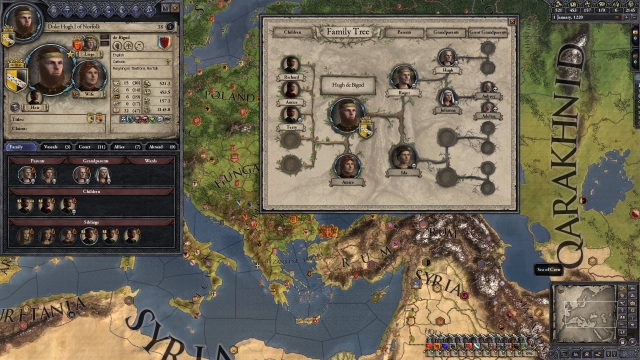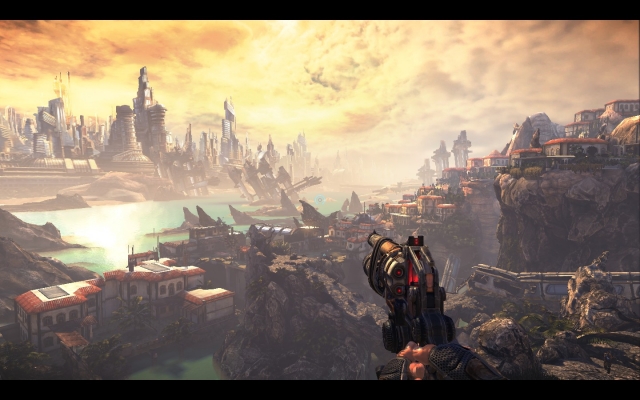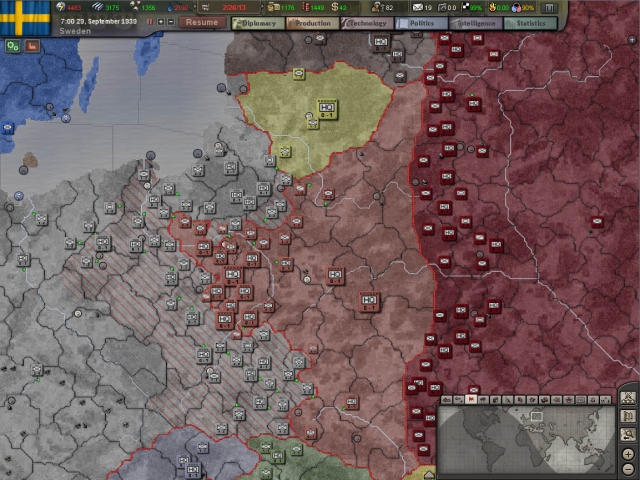
Imagination & Videogames
It’s the summer of 1943 and the sun is beating down onto rolling countryside, its peaks and valleys creating a dance of shadows as clouds roll by above. Field Marshal Heinz Guderian soaks up the weather from his position atop an SdKfz 222 Panzerspahwagen armoured car. Dozing lightly, the field marshal has pulled his cap over his eyes to facilitate his slumber. It had been a lightning-quick few days for him; the advance had been nonstop and soldiers found time to rest when they could.
A sudden ominous rumble makes the previously-peaceful general sit up, catching his cap as it threatens to tumble from the car. He checks his watch, squinting against the sun’s glare. It’s started earlier than planned, he muses. The first sonorous rumble, before it can peter out, it’s joined by a second, third and then fourth. Even in the light of midday Guderian can see the distant lightning-like flashes of combat. With a sigh at his interrupted nap, the field marshal swings his legs back into the cabin of the car, rapping on its side with his knuckles. The engine sputters into life, belching black smog from its exhaust vents. The final battle for London is about to begin.
--
You’d be forgiven for thinking that that was an excerpt from some awful and historically inaccurate fiction, but it’s a scenario that I found myself imagining while playing Hearts of Iron III. I’m a daydreamer and always have been – I’ve been known to trail off during very important conversations to watch birds outside of windows and rearrange pens on my desk. As such I often find myself creating my own personal stories for characters in my games. Even those that have nothing more than a portrait and name, as in many of Paradox Studios’ grand strategy games do, will have their backstories and idiosyncrasies mapped out in my mind. Increasingly, however, I’m finding that many games being released leave no room for imagination or creativity. With copy-paste settings, clichéd characters and an ever-increasing reliance on graphics and fidelity, is catering to those who like to use their imagination becoming something of an after-thought?
Increasingly, however, I’m finding that many games being released leave no room for imagination or creativity. With copy-paste settings, clichéd characters and an ever-increasing reliance on graphics and fidelity, is catering to those who like to use their imagination becoming something of an after-thought?
Granted, there are game series out there whose setting create vast gaps which players can fill with their own stories and imagination. Mass Effect comes to mind, offering an entire galaxy’s worth of stories and the framework to think them up. BioShock Infinite does well (as has much of the series) in creating a world that the player cannot help but want to know more about. Equally there are games that allow the player to create their own stories which differ wildly from others’. Shadow of Mordor excels at this, offering a flexible way for a narrative to unfold naturally – one person’s nemesis might be another’s easy pickings.
While playing Bulletstorm, a game that purported to break the mould of modern shooters and bring back fun and style, I encountered a typically frustrating example of game neglecting story. In an opening level your character stumbled upon a vista of deserted red-tiled villas surrounded by palm trees, waterfalls and fountains. It’s only ever a background image, and its one I found myself looking at longingly as I wondered what had happened to this former paradise.
 Perhaps imagination and creation to the depth that I’m thinking of suit only one genre of videogames best – real time strategy. I’ve been a fan of the RTS all my life and perhaps it’s the focus on the little guys that helps create these scenarios in my head. I found myself getting attached to the one Brotherhood of Nod trooper who survived a tank attack in Command and Conquer or that Roman soldier left over from storming a breach in Rome: Total War.
Perhaps imagination and creation to the depth that I’m thinking of suit only one genre of videogames best – real time strategy. I’ve been a fan of the RTS all my life and perhaps it’s the focus on the little guys that helps create these scenarios in my head. I found myself getting attached to the one Brotherhood of Nod trooper who survived a tank attack in Command and Conquer or that Roman soldier left over from storming a breach in Rome: Total War.
These features can perhaps be found in RPG games, too. When character progression (and permadeath) factor into it, players will often see themselves become attached to their avatars. Even in spreadsheet-a-like Football Manager there is room for creativity and imagination: I still remember the name of my best players and used to give them fake testimonials and let them play out their last game before retiring in front of a cheering stadium.
Game series’ like Hearts of Iron III add an extra layer to this fabrication by simply not showing these people at all. If you decide to view the map as a flat board, with rectangular unit markers taking the place of divisions and regiments, you never get to see the soldiers under your command. It’s this lack of visual, however, that gets my imagination flowing and what allowed me to write a (currently unfinished) series on the game.
 Perhaps it is a matter of ‘show, don’t tell’ (often a phrase used in writing) – rather than tell the player exactly what is happening in a blow-by-blow, it’s better to give them a starting point and let their imagination take over. I can’t think of many titles that have adhered to that rule strictly, but, with the nature of videogames being a service-based industry, the satisfaction of playing a game to completion might override the need to discover more about its world.
Perhaps it is a matter of ‘show, don’t tell’ (often a phrase used in writing) – rather than tell the player exactly what is happening in a blow-by-blow, it’s better to give them a starting point and let their imagination take over. I can’t think of many titles that have adhered to that rule strictly, but, with the nature of videogames being a service-based industry, the satisfaction of playing a game to completion might override the need to discover more about its world.
As some games continue their journey towards becoming works of art as opposed to simple on-rails time-fillers, there could be more room for the imagination of gamers. With VR around the corner and graphical fidelity becoming ever more realistic, I’ll wager that there will be plenty of people wanting to create their own stories in the future, too.
Or perhaps my imagination is running wild again.








COMMENTS